学位英语重点语法辅导-虚拟语气
英语语法 虚拟语气的知识点归纳
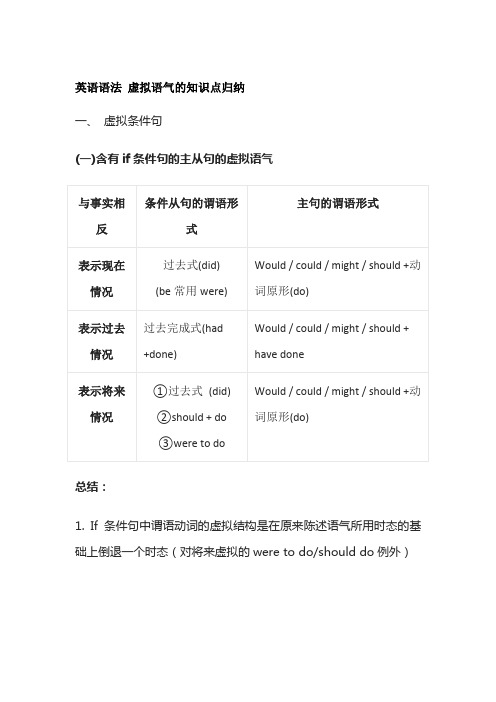
英语语法虚拟语气的知识点归纳一、虚拟条件句(一)含有if条件句的主从句的虚拟语气总结:1. If 条件句中谓语动词的虚拟结构是在原来陈述语气所用时态的基础上倒退一个时态(对将来虚拟的were to do/should do例外)2. 主句要借助于情态动词的过去式,后跟动词原形(现在或将来)或have done(过去);if条件句中只出现一个情态动词,即对将来虚拟的should.3.做此类题目时一定要分清是从句还是主句谓语动词的虚拟,还要把握好时态。
注意:1. 在虚拟条件从句中,动词“be”的过去时态一律用”were”,不用was。
2. 在虚拟条件状语中如果有were, should, had这三个词中任何一个,可省略if,把这三个词提到主语之前, 变成:were/should/had +主语+剩余成分。
3.在虚拟条件状语从句中,省略连词的倒装形式的句首不能用动词的缩略形式。
如我们可说Were I not to do., 而不能说Weren‘t I to do。
4.在表示与将来事实相反的条件句中,只能用should,而不能用would,could和might 等。
5.主句中的should通常用于第一人称,would,could以及might 可以用于各种人称eg :①If I were a bird, I could fly in the air.如果我是一只小鸟,我就能在空中飞行。
②I wish I could pass the examination.我希望我能通过考试。
在虚拟条件句中,对于与将来事实相反的情形,请注意以下几点:(1)条件从句表示的内容与将来事实相反,实为对将来情况的推测,用过去时表示虚拟;(2)条件从句谓语除用过去式外,有时也用“should+动词原形(表示可能性极小,常译为“万一”)”或“were to+动词原形(表示与将来事实相反的假设)”;(3)条件从句使用“should+动词原形”这样的谓语形式时,主句谓语除可用“should (would, could, might)+动词原形”这样的虚拟语气形式外,也可用直陈语气或祈使语气。
(完整版)英语虚拟语气语法归纳总结
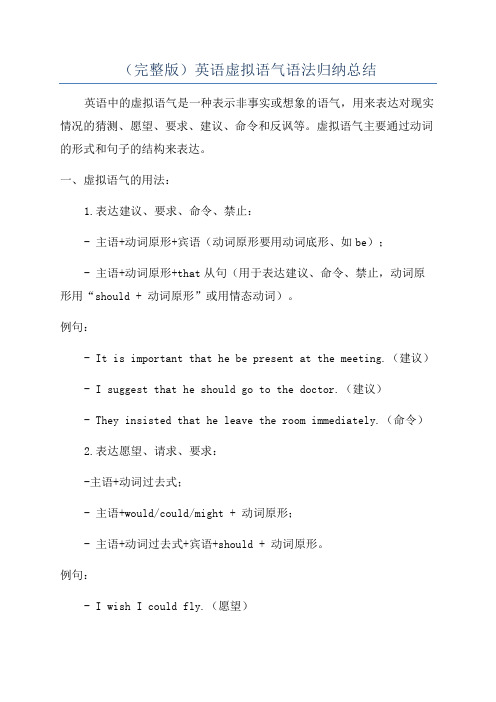
(完整版)英语虚拟语气语法归纳总结英语中的虚拟语气是一种表示非事实或想象的语气,用来表达对现实情况的猜测、愿望、要求、建议、命令和反讽等。
虚拟语气主要通过动词的形式和句子的结构来表达。
一、虚拟语气的用法:1.表达建议、要求、命令、禁止:- 主语+动词原形+宾语(动词原形要用动词底形、如be);- 主语+动词原形+that从句(用于表达建议、命令、禁止,动词原形用“should + 动词原形”或用情态动词)。
例句:- It is important that he be present at the meeting.(建议)- I suggest that he should go to the doctor.(建议)- They insisted that he leave the room immediately.(命令)2.表达愿望、请求、要求:-主语+动词过去式;- 主语+would/could/might + 动词原形;- 主语+动词过去式+宾语+should + 动词原形。
例句:- I wish I could fly.(愿望)- I would appreciate it if you could help me.(请求)3.表示虚拟条件:- If条件从句中的谓语动词用过去完成时,主句用would/should/might/could + have + 过去分词;- If条件从句中的谓语动词用过去时,主句用would/should/could + 动词原形。
例句:- If I had known his phone number, I would have called him.(虚拟条件)- If you had listened to me, we could have finished the project earlier.(虚拟条件)4.表达建议、要求、祝愿:- If only内部称述 + 主语 + 过去式。
学位英语虚拟语气
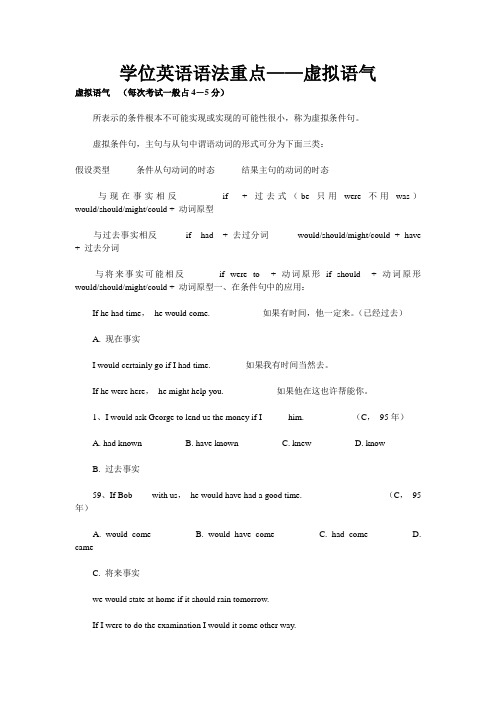
学位英语语法重点——虚拟语气虚拟语气(每次考试一般占4-5分)所表示的条件根本不可能实现或实现的可能性很小,称为虚拟条件句。
虚拟条件句,主句与从句中谓语动词的形式可分为下面三类:假设类型条件从句动词的时态结果主句的动词的时态与现在事实相反if + 过去式(be只用were不用was)would/should/might/could + 动词原型与过去事实相反if had + 去过分词would/should/might/could + have + 过去分词与将来事实可能相反if were to + 动词原形if should + 动词原形would/should/might/could + 动词原型一、在条件句中的应用:If he had time,he would come. 如果有时间,他一定来。
(已经过去)A. 现在事实I would certainly go if I had time. 如果我有时间当然去。
If he were here,he might help you. 如果他在这也许帮能你。
1、I would ask George to lend us the money if I _____ him. (C,95年)A. had knownB. have knownC. knewD. knowB. 过去事实59、If Bob____ with us,he would have had a good time. (C,95年)A. would comeB. would have comeC. had comeD. cameC. 将来事实we would state at home if it should rain tomorrow.If I were to do the examination I would it some other way.注意:⑴条件从句中,如果含有be动词、助动词、情态动词,had,should或动词to have,可省略if,要倒装,即把这些词放到主语前面。
英语语法 虚拟语气的知识点归纳
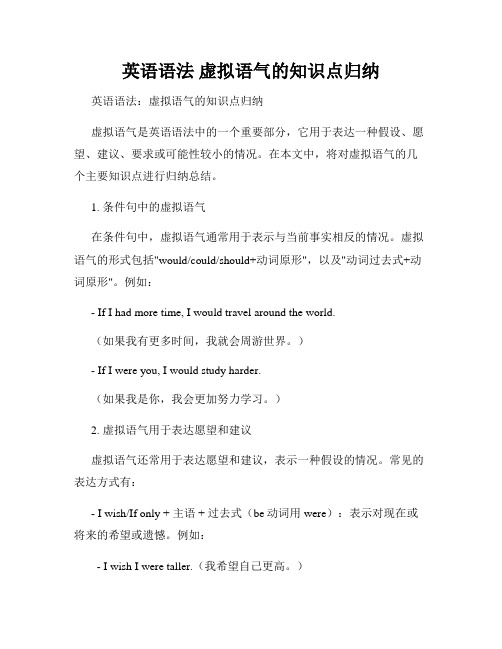
英语语法虚拟语气的知识点归纳英语语法:虚拟语气的知识点归纳虚拟语气是英语语法中的一个重要部分,它用于表达一种假设、愿望、建议、要求或可能性较小的情况。
在本文中,将对虚拟语气的几个主要知识点进行归纳总结。
1. 条件句中的虚拟语气在条件句中,虚拟语气通常用于表示与当前事实相反的情况。
虚拟语气的形式包括"would/could/should+动词原形",以及"动词过去式+动词原形"。
例如:- If I had more time, I would travel around the world.(如果我有更多时间,我就会周游世界。
)- If I were you, I would study harder.(如果我是你,我会更加努力学习。
)2. 虚拟语气用于表达愿望和建议虚拟语气还常用于表达愿望和建议,表示一种假设的情况。
常见的表达方式有:- I wish/If only + 主语 + 过去式(be动词用were):表示对现在或将来的希望或遗憾。
例如:- I wish I were taller.(我希望自己更高。
)- If only she could speak fluent English.(要是她能说一口流利的英语就好了。
)- It is time + 主语 + 过去式(should + 动词原形):用于表示现在或将来应该发生的动作。
例如:- It is time we started the meeting.(是时候开始会议了。
)- It is time you should apologize to her.(你应该向她道歉了。
)3. 虚拟语气在宾语从句中的使用在宾语从句中,若主句的动词表达了建议、命令、要求等含义时,宾语从句中的谓语动词常使用虚拟语气。
具体的用法如下:- 建议:suggest/recommend + (that) + 主语 + (should)+ 动词原形。
虚拟语气英语知识点总结

虚拟语气英语知识点总结一、虚拟语气的概念。
虚拟语气是一种特殊的动词形式,用来表示说话人所说的话不是一个事实,而是一种假设、愿望、怀疑、猜测或建议等。
二、虚拟语气在条件句中的用法。
1. 与现在事实相反的虚拟条件句。
- 结构:从句(If + 主语+ 动词的过去式(be动词一般用were)),主句(主语+ would/should/could/might+动词原形)。
- 例如:If I were you, I would study harder.(如果我是你,我会更努力学习。
实际上我不是你)2. 与过去事实相反的虚拟条件句。
- 结构:从句(If+主语+had+过去分词),主句(主语+would/should/could/might + have+过去分词)。
- 例如:If he had taken my advice, he would have passed the exam.(如果他听了我的建议,他就会通过考试了。
实际上他没听建议,也没通过考试)3. 与将来事实相反的虚拟条件句。
- 结构:从句(If+主语+动词的过去式/should+动词原形/were to+动词原形),主句(主语+would/should/could/might+动词原形)。
- 例如:If it rained tomorrow, we would stay at home.(如果明天下雨,我们就会待在家里。
明天是否下雨还不确定,但这是一种假设情况)- 或者If he should come tomorrow, I would tell him the news.(如果他明天来,我就会告诉他这个消息)- 以及If I were to see her tomorrow, I would give her the book.(如果我明天见到她,我就会把书给她)三、虚拟语气在宾语从句中的用法。
1. wish后的宾语从句。
- 表示与现在事实相反的愿望,从句谓语动词用过去式(be动词用were)。
英语《虚拟语气》语法知识总结归纳
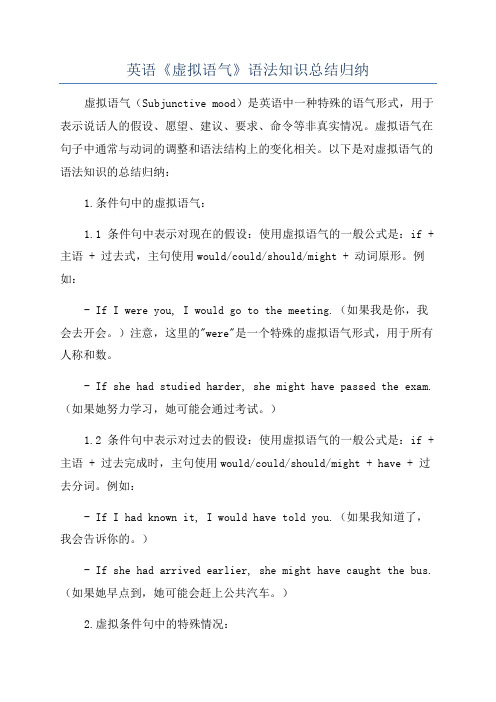
英语《虚拟语气》语法知识总结归纳虚拟语气(Subjunctive mood)是英语中一种特殊的语气形式,用于表示说话人的假设、愿望、建议、要求、命令等非真实情况。
虚拟语气在句子中通常与动词的调整和语法结构上的变化相关。
以下是对虚拟语气的语法知识的总结归纳:1.条件句中的虚拟语气:1.1 条件句中表示对现在的假设:使用虚拟语气的一般公式是:if + 主语 + 过去式,主句使用would/could/should/might + 动词原形。
例如:- If I were you, I would go to the meeting.(如果我是你,我会去开会。
)注意,这里的"were"是一个特殊的虚拟语气形式,用于所有人称和数。
- If she had studied harder, she might have passed the exam.(如果她努力学习,她可能会通过考试。
)1.2 条件句中表示对过去的假设:使用虚拟语气的一般公式是:if + 主语 + 过去完成时,主句使用would/could/should/might + have + 过去分词。
例如:- If I had known it, I would have told you.(如果我知道了,我会告诉你的。
)- If she had arrived earlier, she might have caught the bus.(如果她早点到,她可能会赶上公共汽车。
)2.虚拟条件句中的特殊情况:2.1 在虚拟条件句中表示命令、建议时,主句中的动词可以使用动词原形(而不是would/could/should/might + 动词原形)。
例如:- If you have any questions, please let me know.(如果你有任何问题,请告诉我。
)- If I were you, I would take a break.(如果我是你,我会休息一下。
学士学位英语考试语法大全:虚拟语气
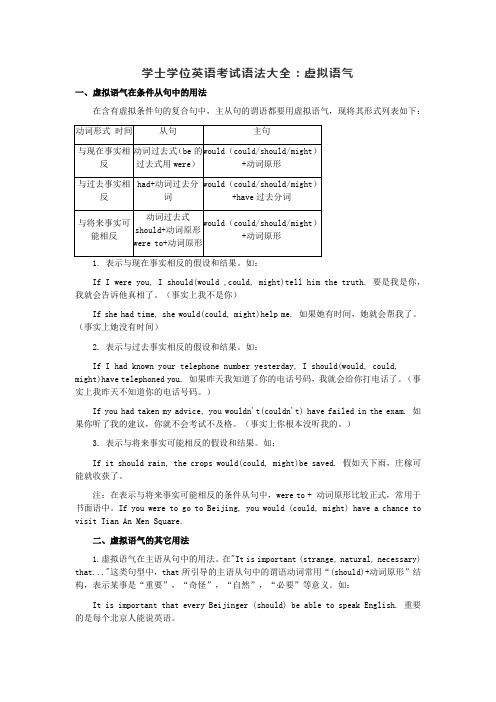
学士学位英语考试语法大全:虚拟语气一、虚拟语气在条件从句中的用法在含有虚拟条件句的复合句中,主从句的谓语都要用虚拟语气,现将其形式列表如下:It is necessary that he (should) be sent to hospital at once. 有必要马上把他送医院。
2.虚拟语气在宾语从句中的用法。
(1)在动词wish后的宾语从句中,表示与现在或过去的事实相反,或对将来的主观愿望,从句通常省略连词that。
a.表示对现在情况的虚拟:从句动词用过去式或过去进行时(be的过去式用were)表示。
如:I wish I knew the answer to the question. 我希望知道这个问题的答案。
(可惜不知道。
)I wish it were spring in my hometown all the year around. 但愿我的家乡四季如春。
(只是愿望,实际根本不可能实现。
)b.表示对过去情况的虚拟:从句动词用had+过去分词。
如:I wish (that) I hadn't wasted so much time. 我后悔不该浪费这么多时间。
(实际上已经浪费掉了。
)He wishes (wished) he hadn't lost the chance. 他真希望没有失去机会。
(事实上机会已经失去了,他感到惋惜。
)c.表示对将来的主观愿望:谓语动词形式为“would/should/could/might+动词原形”,此时要注意,主句的主语与从句的主语不能相同,因为主句的主语所期望的从句动作能否实现,取决于从句主语的态度或意愿(非动作名词除外)。
如:I wish it would stop raining. 但愿雨能停止。
I wish you would be quiet. 我希望你安静一些。
(2)在suggest(建议), demand(要求), order(命令), propose(建议), insist (坚持要做), command(命令), request(要求), desire(希望)等动词后的宾语从句中,谓语动词用“(should)+动词原形”,表示建议,要求,命令等。
曹胖学位英语虚拟语气
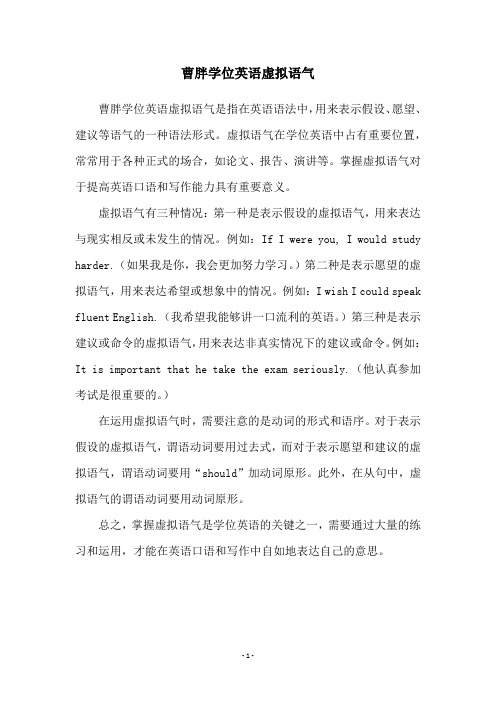
曹胖学位英语虚拟语气
曹胖学位英语虚拟语气是指在英语语法中,用来表示假设、愿望、建议等语气的一种语法形式。
虚拟语气在学位英语中占有重要位置,常常用于各种正式的场合,如论文、报告、演讲等。
掌握虚拟语气对于提高英语口语和写作能力具有重要意义。
虚拟语气有三种情况:第一种是表示假设的虚拟语气,用来表达与现实相反或未发生的情况。
例如:If I were you, I would study harder.(如果我是你,我会更加努力学习。
)第二种是表示愿望的虚拟语气,用来表达希望或想象中的情况。
例如:I wish I could speak fluent English.(我希望我能够讲一口流利的英语。
)第三种是表示建议或命令的虚拟语气,用来表达非真实情况下的建议或命令。
例如:It is important that he take the exam seriously.(他认真参加考试是很重要的。
)
在运用虚拟语气时,需要注意的是动词的形式和语序。
对于表示假设的虚拟语气,谓语动词要用过去式,而对于表示愿望和建议的虚拟语气,谓语动词要用“should”加动词原形。
此外,在从句中,虚拟语气的谓语动词要用动词原形。
总之,掌握虚拟语气是学位英语的关键之一,需要通过大量的练习和运用,才能在英语口语和写作中自如地表达自己的意思。
- 1 -。
- 1、下载文档前请自行甄别文档内容的完整性,平台不提供额外的编辑、内容补充、找答案等附加服务。
- 2、"仅部分预览"的文档,不可在线预览部分如存在完整性等问题,可反馈申请退款(可完整预览的文档不适用该条件!)。
- 3、如文档侵犯您的权益,请联系客服反馈,我们会尽快为您处理(人工客服工作时间:9:00-18:30)。
1.英语中的三种语气英语共有三种语气,陈述语气、祈使语气和虚拟语气。
陈述语气用来讲述事实,有肯定、否定、询问和感叹等形式,谓语动词有人称、时态和数的变化;祈使语气用于提出请求、建议、劝告、命令和警告等,以动词原形起句,否定式句前加Don't;虚拟语气表示说话人所言内容不是事实,而是一种假设、愿望、建议、请求、命令或猜测,有时只是说话者的主观愿望,或表达他/她的强烈情感,谓语动词用特殊形式。
2.非真实条件句的虚拟语气巧计主句中五个虚拟引导词:MS COW(奶牛女士):might, should, could, ought to, would2.1. 与过去事实相反1). If I had had much money at that time, I would have bought you what you want.2). If you had been more careful, the mistake might have been avoided.3). If you had taken my advice, you wouldn't have made such a mistake.4). We wouldn't have succeeded if it had not been for their help.5). If you had been here yesterday, you would have met the film star.6). If I had known more about giving first aid, I could have helped them.7). If you had got up earlier, you would have caught the train.8). If we had had enough rain last year, we could have gained a good harvest.9). If you had worked a little harder, you could have passed the final examination.10). If they had invited her to the party, she would have attended it.2.2.与现在事实相反1). If I were you, I would go there at once.2). If my classmates were here, they would help me.3). If I were you, I would accept the job.4). If classes were smaller, children would learn more.5). If I were ten years younger, I would start all over again.6). If I had enough money, I would buy a large house.7). If I had time, I would go shopping with you.8). If I knew all the answers to all your questions, I would be a genius.9). If he were here now, we would ask him about it.10). If I had time, I would study French.11). If I knew her number, I could ring her.(可惜我不知道)12). If there were no gravity, we should not be able to walk.(实际上地球引力始终存在。
)13). If I knew the answer, I would tell you.(实际上我确实不知道,所以肯定不能告诉你。
)14). If I had money on me, I would lend you some.15). We would not be able to walk if there were no friction.16). If you were in my position, what would you do?17). If they treated me as a slave, I had to resign.18). If there were no examinations, we should have a much happier time.19). If wishes were horses, beggars might ride.(如果幻想能成为马匹,叫花子们都有了坐骑。
)20). Life might be too dull if it had no difficulties in it.(倘若生活中没了困难,就会过于平淡。
)2.3. 与将来事实相反1). If it rained / should rain / were to rain tomorrow, we would have a rest.2). If the sun were to rise from the west, I would marry you.(注意:对将来虚拟的条件从句中,在实现的可能性方面过去式did最大,should do中等,were to do 最小。
如本句太阳没有可能从西方升起,所以本句用were to最恰当。
)3). If I were to meet her tomorrow, I would ask her about it.4). If green plants should disappear some day, there would hardly be any life on the earth.5). If I were to do the work, I would do it in a different way.6). If it should(were to) rain this afternoon, the football match would be put off.7). If you missed the film this evening, you would be sorry for it.(如果今晚错过了这场电影,你会遗憾的。
实际上,你不会错过。
)8). If I were to see her tomorrow, I would invite her home.9). If you lived there for several months, you would change your mind about the place.10). If things were to be done twice, all would be wise.(如果事情能被做两次,人人都会变得明智。
)2.4. 混合型1). If you had followed the doctor's advice, you would be much better now.(过去→现在)2). If you had worked hard, you would be a college student now.(过去→现在)3). If you had listened to me, you wouldn't be in such trouble now.(过去→现在)4). If you had got six more votes yesterday, you would be our chairman now.(过去→现在)5). If I had earned much money last summer, I would go on a vacation next month.(过去→将来)6). If you hesitated this moment, you might suffer in future.(现在→将来)7). If the doctor had come sooner last night, Tom would be alive today.(过去→现在)8). If I were you, I would have gone to her birthday party.(现在→过去)9). If it had rained last night, the ground would be wet now.(过去→现在)10). If you hadn't lent me some money, I couldn't have bought the new house and most likely I wouldn't be still living in the dangerous house now.(过去→过去→现在)2.5. if的省略与条件句的倒装1). Were I you, I would have accepted the job.2). Were she here, she would support us.3). Were you to go fishing with me, you would have a much happier time.4). Were men angels, no government would be necessary.(如果人人都是天使,政府就没有必要了。
)5). Were she my daughter, I wouldn't allow her to study abroad.6). Had you come earlier, you would have met my girlfriend.7). Had I time, I would come.(本句中had是实意动词,而非主动词。
)8). Had I been informed earlier, I could have done something to prevent it from happening.9). Many persons in the worls would have succeeded had they not wasted their valuable time.10). Should it be fine tomorrow, we would go outing.11). Should you change your mind, no one would blame you.12). We would gone to your birthday party had you invited us.13. I would go should it be necessary.14). What would have happened had Bob walked farther, as far as the river bank?15). Had it not been for you, I would have lost my way.16). Were it not for water, no plant could grow.17). Be they common people or high-ranking officials, they stand equal before the law. (Whether they be…)18). Be the weather what it may, I will leave tomorrow. (Whether the weather be what it may, …)注意:在这一结构中,若条件句为否定句,not应被放在主语之后,而不能缩写成weren't, shouldn't或hadn't而置于居首。
